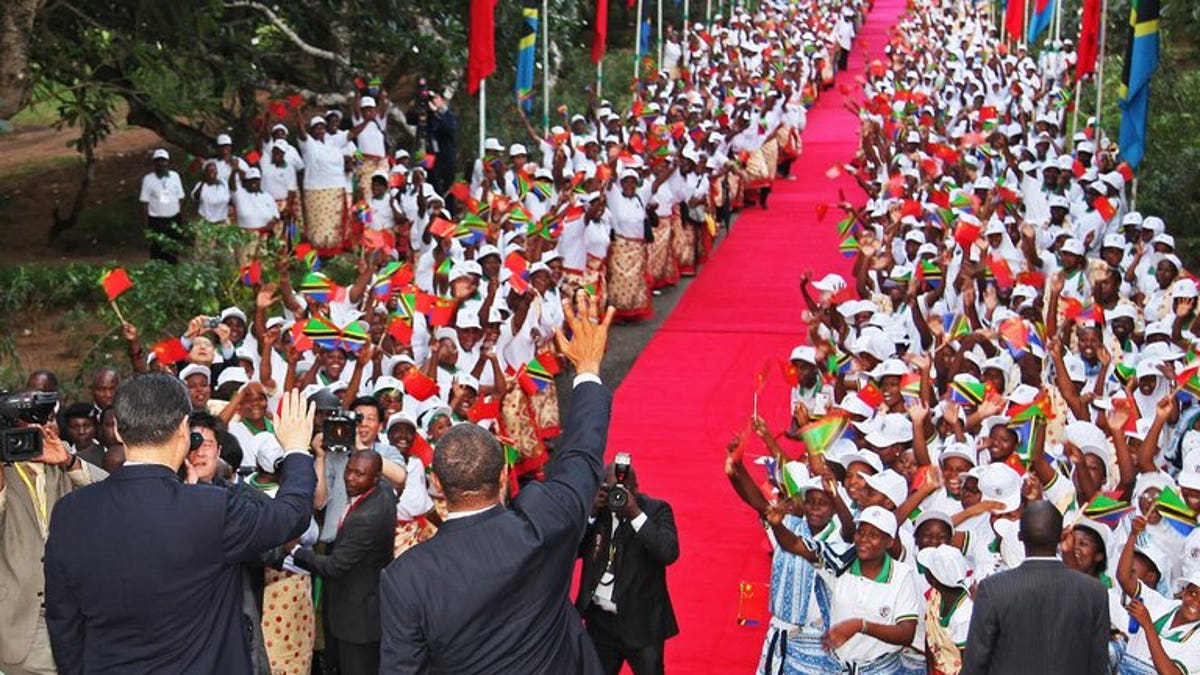
Chinese President Xi Jinping (L) and Tanzanian President Jakaya Kikwete (R) wave to crowds in Dar Es Salaam on March 24, 2013. World leaders visit Africa relatively little, but Tanzania is preparing to host US President Barack Obama just three months since a state visit the Chinese leader. (AFP/File)
NAIROBI (AFP) – World leaders visit Africa relatively little, but Tanzania is preparing to host US President Barack Obama just three months since a state visit by Chinese leader Xi Jinping.
While Washington has long and strong ties with Tanzania, Obama's Africa visit is seen by some as one part of wider US efforts to boost its presence, as well as to counter Beijing's growing influence on the resource-rich continent.
After Xi's March visit, in which he spoke of Beijing's "sincere friendship" with Africa and said its trade with China reached $200 billion in 2012, Washington stressed its "positive agenda" with the continent.
"The Obama administration also recognises that US business needs to do better in Africa - for too long the approach has been dominated by counter-terrorism and humanitarian priorities," said Alex Vines of Britain's Chatham House thinktank.
In terms of choosing Tanzania, analysts are swift to say there are many other factors than direct competition between Washington and Beijing for a US visit.
The US is the largest single development partner in terms of actual funds for infrastructure to Tanzania, notes J. Peter Pham of the Atlantic Council's Africa Center, adding that Washington must balance geographic regions as well as religious and linguistic zones in choosing nations on a continental tour.
"While it can be said that in many places in Africa, especially on the trade and investment front, the United States needs to play catch up, that is not the case with Tanzania," he added, stressing it was wrong to explain Obama's choice as being motivated by Xi's recent visit.
For Pham, Obama's visit to Tanzania is more about diplomatic difficulties in visiting neighbouring Kenya -- birthplace of Obama's father -- due to upcoming international crimes against humanity trials for President Uhuru Kenyatta.
But Obama's tour -- his third visit to Africa -- marks wider efforts by the US to boost its presence on the continent.
"There is an appreciation that the US has not paid sufficient high-level attention to Africa in recent years as compared to what China has been doing," said David Shinn, a former US ambassador to Ethiopia and now a professor at The George Washington University.
China overtook the US as Africa's biggest trade partner in 2009, notes Pham.
China's business boom and its rise to become the world's second-largest economy has seen financial and trade ties rocket in recent years, as it sources many of its raw materials from Africa.
A new Chinese diaspora has seen huge numbers of traders and small business operators establish themselves across the continent, which has higher growth rates than Europe or the US.
"Much of China's engagement has been conducted by private and state-owned companies. The US private sector in recent years has not kept pace," Shinn said.
"To some extent, the US is now trying to play catch-up with China and other countries such as Brazil, India and Turkey."
In terms of Obama's visit to a Tanzania -- a relatively stable nation, with a rapidly growing population and significant offshore natural gas deposits -- Vines notes that security, good governance, trade, and aid will be likely key objectives of the trip.
But pithy conclusions of complex diplomatic and economic relations across a 54-nation continent are often gross over-simplifications, and Vines is careful to note, for example, that in eastern Africa and the Indian Ocean, it is actually India-China rivalry that "is more notable".
Still, the US and Western nations are keen to boost their presence to ensure their economic partnerships remain strong.
"Recently, China and other emerging nations have been winning this competition in Africa vis-a-vis the US and European countries," Shinn added.
"As North America and Europe put the financial crisis behind it, I believe they will reemerge as strong competitors in Africa. International commerce is dynamic; no country stays on top forever."
And while US engagement on the continent is already strong in many areas, a presidential visit offers a very public sign of engagement.
"Africans have been wondering what happened to their son... They have seen the Chinese leaders on their continent so frequently now, that they know more about Beijing than Washington," grumbled Mwangi Kimenyi, director of the African Growth Initiative at Washington's Brookings Institute.
Kimenyi, in a letter penned to Obama and printed in Kenya's Daily Nation newspaper, asks him to take a good look at the homeland of his father as he flies overhead, but not to confuse the fires of small businesses with the flames of past election violence.
"What you see will be people going on with their business like bees," he writes, before ending with a jibe that if he spots machines, "that is our Chinese partners' bulldozer working on our new bypasses."








































